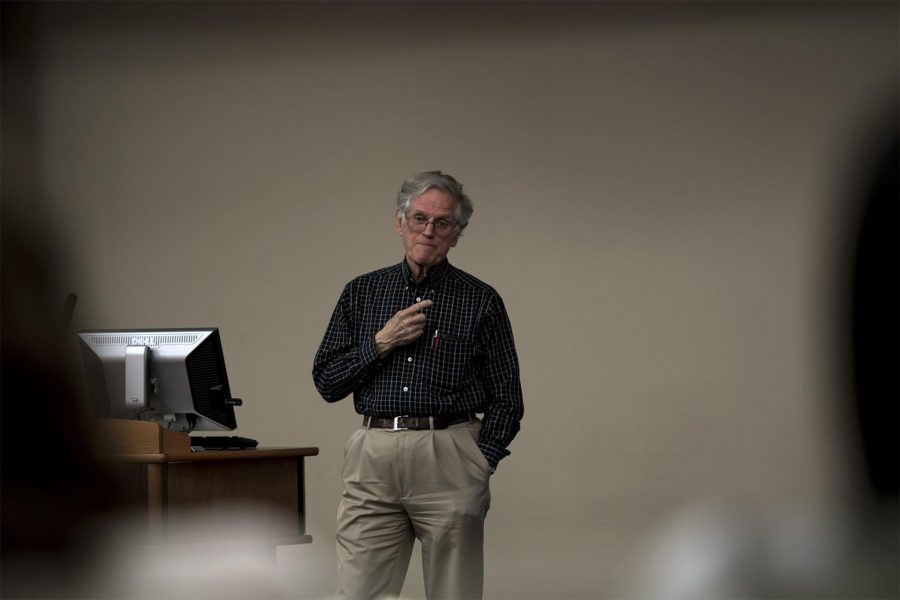Professor presents on human rights attitudes
March 22, 2017
A WKU professor emeritus gave a presentation on human rights as part of the College of Education and Behavioral Sciences Reach Event.
Sam McFarland, professor emeritus and human rights activist, gave a presentation titled “Who Cares about Human Rights?” The presentation was part of the Spring 2017 Reach Event, for which several College of Education and Behavioral Sciences professors gave poster presentations and symposiums of their research.
McFarland began his presentation with a brief overview of the history of human rights, which he said he views as the “most important untaught topic” at universities. McFarland’s recent research centered on the question “who cares about human rights?”
As part of his overview of human rights, McFarland distributed copies of the Universal Declaration of Human Rights, adopted by the United Nations in 1948. McFarland broke down various parts of the declaration and noted its importance to human rights.
“If you get nothing else out of this presentation today, that will be the most valuable thing that I can share,” McFarland said of the declaration.
McFarland also broke down various pieces of research that discuss “who cares” about human rights. According to a Gallup poll from Jan., 53 percent of Americans view “promoting and defending human rights in other countries” as “very important,” and 34 percent view it as “somewhat important.”
“In summary, these polls suggest strong support for human rights in the United States and around the world,” McFarland said. “But there are country variations.”
McFarland went on to present another poll, which outlined variations in different countries’ opinions about human rights. McFarland said the United States shows strong support for protection of civil and political rights, but less support for economic and social rights.
According to information presented by McFarland, the United States polls above the global average in protecting rights such as freedom of speech, freedom of religion and the right to express opinion. However, the United States polls below the global average and countries like Russia and the United Kingdom, when it comes to protecting rights such as government assistance in food and healthcare.
“We are less supportive than any other nation, really, that’s been studied on support for social and economic rights,” McFarland said.
As part of his presentation, McFarland also discussed various ways he has collected data on human rights and how people care for human rights. Using two different methods, the Human Rights Choices Questionnaire and the Human Rights Scenarios Scale, McFarland and those he’s researched with found several major reasons someone may or may not care about human rights.
High levels of ethnocentrism, a “general tendency to dislike all outgroups,” will cause someone to care less about human rights, according to McFarland and Melissa Matthews, a former graduate student at WKU. Alternatively, high levels of “identification with all humanity” will cause someone to care more about human rights.
McFarland ended his presentation by briefly discussing the Syrian War, which he said has displaced over 4.9 million Syrians. McFarland said accepting refugees is one of the “more divisive issues in American politics these days.”
“People are at extremes,” McFarland said. “They are either very much for or very much against this issue.”
Reporter Monica Kast can be reached at 270-745-0655 or [email protected].















![Students cheer for Senator at Large Jaden Marshall after being announced as the Intercultural Student Engagement Center Senator for the 24th Senate on Wednesday, April 17 in the Senate Chamber in DSU. Ive done everything in my power, Ive said it 100 times, to be for the students, Marshall said. So, not only to win, but to hear that reaction for me by the other students is just something that shows people actually care about me [and] really support me.](https://wkuherald.com/wp-content/uploads/2024/04/jadenmarshall-1200x844.jpg)


![Students cheer for Senator at Large Jaden Marshall after being announced as the Intercultural Student Engagement Center Senator for the 24th Senate on Wednesday, April 17 in the Senate Chamber in DSU. Ive done everything in my power, Ive said it 100 times, to be for the students, Marshall said. So, not only to win, but to hear that reaction for me by the other students is just something that shows people actually care about me [and] really support me.](https://wkuherald.com/wp-content/uploads/2024/04/jadenmarshall-600x422.jpg)







